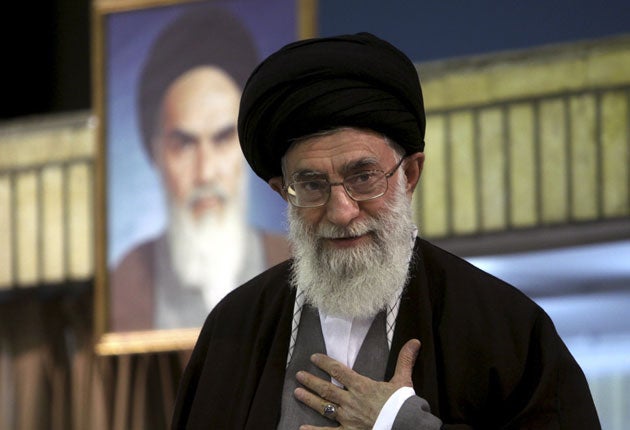Iran's coming elections will test Khamenei's regime
Provoking political dispute in the run up to elections has been declared treasonous

Your support helps us to tell the story
From reproductive rights to climate change to Big Tech, The Independent is on the ground when the story is developing. Whether it's investigating the financials of Elon Musk's pro-Trump PAC or producing our latest documentary, 'The A Word', which shines a light on the American women fighting for reproductive rights, we know how important it is to parse out the facts from the messaging.
At such a critical moment in US history, we need reporters on the ground. Your donation allows us to keep sending journalists to speak to both sides of the story.
The Independent is trusted by Americans across the entire political spectrum. And unlike many other quality news outlets, we choose not to lock Americans out of our reporting and analysis with paywalls. We believe quality journalism should be available to everyone, paid for by those who can afford it.
Your support makes all the difference.The situation for the mullahs in Iran and their leader Ali Khamenei has never been so bleak. Facing growing discontent at home, and waning support abroad, Khamenei is desperate to prolong the life of a regime that many think is crumbling.
In the run-up to the elections, just a few weeks away, Khamenei and his cohorts fear a repeat of the 2009 post-election protests and have moved to silence any dissent, going so far as to label provoking political differences treason.
The outgoing President, Mahmoud Ahmadinejad, once a Khamenei favourite, has now turned against his master and accused the clerical establishment of corruption. In response Khamenei has reportedly increased pressure and threatened Ahmadinejad and his associates with severe repercussions. Even Ali-Akbar Hashemi Rafsanjani, once a regime stalwart, has not been immune to the threats.
Khamenei is in a bind in regard to the elections and the regime’s tolerance of dissent.
If he allows for a diversity of candidates, this may quickly get out of hand and criticism of the establishment will increase. Yet if he continues to crackdown on small criticisms and limit the number of candidates, it may only serve to further alienate zealous supporters and Basij military forces and make the regime even weaker from within.
The regime faces a similar dilemma in regard to its nuclear issue. Crippling sanctions and international isolation has led some in power to question whether this plan serves the best interest of the clerical establishment. The mullahs know that sanctions have increased domestic unrest and left the government in a vulnerable position - both in terms of finances and outside support. But can Iran afford to compromise on its nuclear ambitions?
For years the mullahs have argued that the nuclear program is a “train without brakes”. If the regime does pull the plug on its nuclear program it could undermine the image it has spent so much time and energy to build, costing morale amongst supporters and boosting the growing number of nuclear dissenters.
It appears that there are no easy choices for the rulers in Tehran. To see the truth of this matter one need look no further than the situation in Syria. The regime and its regional ally Hezbollah have shown willingness to resort to the most grotesque and wanton acts of violence and terror in order to delay the fall of Bashar al-Assad.
Khamenei has not forgotten the days of rage - which followed the presidential elections in 2009 - and is fearful of a repeat of that scenario. Nearly 75 per cent of the population is under the age of 35 and anxious for real change. That has provided a fertile ground for the organized resistance. To that effect, the network of the opposition, the People's Mojahedin Organization of Iran (PMOI/MEK), has started in recent weeks to call for regime change throughout Iran.
Despite a crackdown, graffiti and posters criticising the regime have appeared in many streets and highway overpasses in Tehran and various other cities, including Isfahan, and Shiraz, with slogans like “Our Vote is for Overthrow”.
The demand for overthrow has been best articulated in the 10 point plan by Mrs Maryam Rajavi, the President elect of the National Council of Resistance of Iran, the preeminent Iranian opposition organisation. Mrs Rajavi’s plan calls for a democratic secular republic in Iran, free of nuclear weapons, capital punishment, and tolerant to all religions, ethnicities and ideas. The opposition rally in Paris last year drew more than 100,000 supporters, a tour de force of political support.
At this crucial moment in the Iranian history, the world should not ignore the on-going demands for genuine democratic change by millions of Iranians. We must stand with the Iranian opposition in ridding Iran of the reign of Ayatollahs terror once and for all.
Baroness Turner of Camden was deputy speaker of the British House of Lords until 2008 and is a prominent member of the British Parliamentary Committee for Iran Freedom.
Join our commenting forum
Join thought-provoking conversations, follow other Independent readers and see their replies
Comments